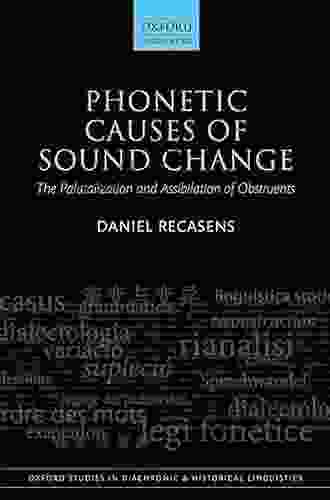Phonetic Causes of Sound Change: Unraveling the Roots of Linguistic Evolution

Language is a living, breathing entity, constantly evolving and adapting to the needs of its speakers. This evolution manifests itself in a myriad of ways, including changes in grammar, vocabulary, and pronunciation. One of the most fascinating aspects of linguistic evolution is sound change, the gradual alteration of the sounds used to represent specific words or phonemes.
4.3 out of 5
| Language | : | English |
| File size | : | 3807 KB |
| Screen Reader | : | Supported |
| Print length | : | 240 pages |
| Lending | : | Enabled |
The study of sound change has long captivated linguists, and one of the most influential works on the subject is 'Phonetic Causes of Sound Change' by renowned historical linguist Winfred P. Lehmann. This seminal book, first published in 1962, has profoundly shaped our understanding of the forces that drive sound change and remains an essential resource for scholars and students alike.
The Nature of Sound Change
Sound change is not a random or arbitrary process. It is driven by a complex interplay of factors, including:
- Phonetic Factors: The physical characteristics of the sounds themselves, such as their place and manner of articulation, can influence their susceptibility to change.
- Phonological Factors: The interactions between sounds within a language's phonological system can also trigger sound changes.
- Morphological Factors: Changes in the morphological structure of words can lead to changes in their pronunciation.
- Social Factors: Socioeconomic and cultural factors can also play a role in shaping the trajectory of sound change.
Phonetic Causes of Sound Change
While all of the above factors can contribute to sound change, Lehmann's book focuses specifically on the phonetic causes of sound change. He argues that the vast majority of sound changes can be attributed to the natural tendencies of speech production and perception.
One of the key concepts in Lehmann's theory is the idea of ease of articulation. Sounds that are easier to pronounce are more likely to be favored over those that are more difficult. This principle explains why, for example, voiceless stops (e.g., /p/, /t/, /k/) are more common than voiced stops (e.g., /b/, /d/, /g/) in many languages.
Another important factor discussed by Lehmann is the coarticulation of adjacent sounds. When sounds are produced in sequence, they can influence each other's pronunciation. For example, the pronunciation of the vowel /i/ is often influenced by the following consonant. In English, the /i/ in "bit" is pronounced differently than the /i/ in "beat" due to the influence of the /t/ and /b/ consonants, respectively.
Examples of Phonetic Causes of Sound Change
Lehmann provides numerous examples of sound changes that can be attributed to phonetic causes. Some of the most common examples include:
- Assimilation: When a sound becomes more similar to an adjacent sound. For example, the /d/ in "hand" becomes /n/ in "band" due to the influence of the following /n/.
- Dissimilation: When a sound becomes less similar to an adjacent sound. For example, the /l/ in "milk" becomes /r/ in "silk" to avoid having two /l/ sounds in a row.
- Lenition: When a sound becomes less pronounced or voiced. For example, the /g/ in "bag" becomes /j/ in "badge" due to the influence of the following /d/.
- Fortition: When a sound becomes more pronounced or voiced. For example, the /b/ in "rob" becomes /p/ in "robbed" to emphasize the past tense suffix.
- Metathesis: When the Free Download of sounds in a word changes. For example, the /r/ and /l/ sounds in "bird" are reversed in the word "bridle."
'Phonetic Causes of Sound Change' by Winfred P. Lehmann is a groundbreaking work that has revolutionized our understanding of the forces that drive linguistic evolution. By focusing on the phonetic causes of sound change, Lehmann provides a comprehensive framework for explaining the diverse ways in which languages change over time.
This book is essential reading for anyone interested in historical linguistics, phonology, or language change. It is a valuable resource for scholars, students, and anyone fascinated by the intricate workings of human language.
4.3 out of 5
| Language | : | English |
| File size | : | 3807 KB |
| Screen Reader | : | Supported |
| Print length | : | 240 pages |
| Lending | : | Enabled |
Do you want to contribute by writing guest posts on this blog?
Please contact us and send us a resume of previous articles that you have written.
 Book
Book Novel
Novel Page
Page Chapter
Chapter Text
Text Story
Story Genre
Genre Reader
Reader Library
Library Paperback
Paperback E-book
E-book Magazine
Magazine Newspaper
Newspaper Paragraph
Paragraph Sentence
Sentence Bookmark
Bookmark Shelf
Shelf Glossary
Glossary Bibliography
Bibliography Foreword
Foreword Preface
Preface Synopsis
Synopsis Annotation
Annotation Footnote
Footnote Manuscript
Manuscript Scroll
Scroll Codex
Codex Tome
Tome Bestseller
Bestseller Classics
Classics Library card
Library card Narrative
Narrative Biography
Biography Autobiography
Autobiography Memoir
Memoir Reference
Reference Encyclopedia
Encyclopedia Alex M Hall
Alex M Hall Trent Shelton
Trent Shelton Diane M Browder
Diane M Browder Adrien Gombeaud
Adrien Gombeaud Grace Comerford
Grace Comerford Ahmed Sheikh Abdirashid
Ahmed Sheikh Abdirashid Delphine Minoui
Delphine Minoui Aleksandar Nedeljkovic
Aleksandar Nedeljkovic Simon Garfield
Simon Garfield Gerry Lekas
Gerry Lekas Peter Van Der Linden
Peter Van Der Linden Ahmed Bouyerdene
Ahmed Bouyerdene Alan Shipnuck
Alan Shipnuck Clotaire Rapaille
Clotaire Rapaille Alan Bell
Alan Bell Adrian Bell
Adrian Bell Alborz Azar
Alborz Azar Alan Veale
Alan Veale Ronald Hutton
Ronald Hutton Alephonsion Deng
Alephonsion Deng
Light bulbAdvertise smarter! Our strategic ad space ensures maximum exposure. Reserve your spot today!

 Eliot Foster97 Magical Concoctions Made From Almost Anything: A Culinary Adventure for...
Eliot Foster97 Magical Concoctions Made From Almost Anything: A Culinary Adventure for...
 Floyd RichardsonEmpowering Dreams: Ten Startup Stories from Billion-Dollar Founders of Africa...
Floyd RichardsonEmpowering Dreams: Ten Startup Stories from Billion-Dollar Founders of Africa...
 Alexander BlairRevisit the Transformative Power of Before and After with the Revised Edition
Alexander BlairRevisit the Transformative Power of Before and After with the Revised Edition T.S. EliotFollow ·6.6k
T.S. EliotFollow ·6.6k Neal WardFollow ·7.2k
Neal WardFollow ·7.2k Junot DíazFollow ·6.8k
Junot DíazFollow ·6.8k Forrest BlairFollow ·3.2k
Forrest BlairFollow ·3.2k Esteban CoxFollow ·17.4k
Esteban CoxFollow ·17.4k August HayesFollow ·13.7k
August HayesFollow ·13.7k Ross NelsonFollow ·19.4k
Ross NelsonFollow ·19.4k Ian PowellFollow ·15.6k
Ian PowellFollow ·15.6k

 Brandon Cox
Brandon CoxStronger: Forty Days of Metal and Spirituality
A 40-day...

 Dustin Richardson
Dustin RichardsonDelve into the Gripping World of British Crime: DCI Kett...
Unveiling the Intricate Tapestries of Crime...

 Giovanni Mitchell
Giovanni MitchellTrue Wealth Starts In The Mind: Unleash Your Inner...
In the pursuit of...

 Duncan Cox
Duncan CoxPulse Pounding British Crime Thriller: DCI Kett Crime...
Prepare for...

 Dashawn Hayes
Dashawn HayesUnveiling the Unwavering Strength and Inspiring Journey...
In the annals of wrestling history, the name...
4.3 out of 5
| Language | : | English |
| File size | : | 3807 KB |
| Screen Reader | : | Supported |
| Print length | : | 240 pages |
| Lending | : | Enabled |








